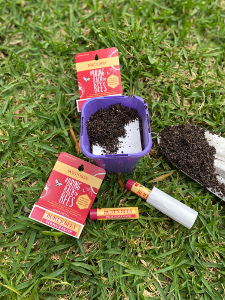With continuing urbanisation, we’re seeing a decline in bee-friendly environments, with the result that the world’s bee population is under serious threat. According to Burt’s Bees, in the bushfires we had last Summer, an estimated 15.6 million hectares of bee-friendly native Australian forests were destroyed. Bees are natures powerhouse – up to one third of the food we eat relies on them for pollination, and the decline in bee numbers worldwide is alarming.
Partnering with the Wheen Bee Foundation and Floraly, Burt’s Bees are encouraging us to #bringbackthebees this Summer. Burt’s Bees have launched a limited edition Bring Back The Bees Pomegranate Lip Balm, in conjunction with the Wheen Bee Foundation, an Australian registered charity promoting awareness of the importance of bees for food security and ecosystem health. The limited edition Lip Balm contains a strip of seeded paper, containing bee-friendly Swan River Daisy seeds for you to grow at home, and help give bees the food they need to pollinate. Floraly, a sustainable florist who only source farm-fresh seasonal flowers when you place your order, resulting in less flower waste, have joined with Burt’s Bees in creating a Bee Friendly Bouquet that is full of locally sourced flowers and foliage, and each bouquet purchased in October ships with the limited edition Burt’s Bees Bring Back The Bees Pomegranate Lip Balm (it’s an ideal gift). Limited edition Burt’s Bees Bring Back The Bees Pomegranate Lip Balm 4.25g RRP $6.95 (a portion of proceeds from each sale are given to the Wheen Bee Foundation). Available from Woolworths, Chemist Warehouse and Priceline. Floraly Bee Friendly Bouquet RRP $65.00, click here for details.
If you are interested in bringing back the bees, here are the top 3 things you can do, according to Tristan Sender, CEO of Floraly:
- Plant bee-friendly gardens: Bees rely on the pollen and nectar they get from flowers to survive. Increasing urbanisation and the decline of the natural environment has seen much of our natural flora start to disappear- and so too have the bees. Planting native flowers in urban areas will ensure that the bees receive the pollen and nectar they need.
- Buy Organic and local when possible: A lot of our mainstream food is grown in a way that relies heavily on pesticides which have harmful chemicals that are toxic for bees. The more we consume organic food and use less pesticides the better it will be for the bees. Also, consider supporting local growers of flowers instead of imports.
- Eat honey from local farmers and beekeepers: We all love to eat honey, but make sure you purchase honey from ethical local farmers and beekeepers only. Help bee populations to thrive again by only eating honey from local, sustainable beekeepers and farmers that don’t supersize their hives.
I’ve just planted my seeded paper to help #bringbackthebees, and I’ll be sharing my progress as it grows on Instagram – make sure you’re following.




